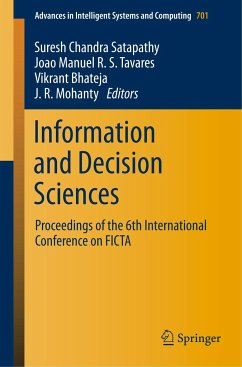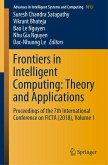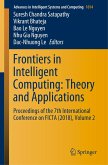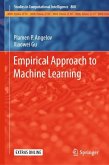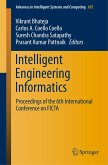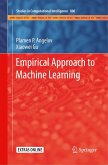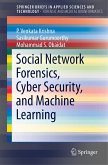Information and Decision Sciences
Proceedings of the 6th International Conference on FICTA
Herausgegeben:Satapathy, Suresh Chandra; Tavares, Joao Manuel R.S.; Bhateja, Vikrant; Mohanty, J. R.
Information and Decision Sciences
Proceedings of the 6th International Conference on FICTA
Herausgegeben:Satapathy, Suresh Chandra; Tavares, Joao Manuel R.S.; Bhateja, Vikrant; Mohanty, J. R.
- Broschiertes Buch
- Merkliste
- Auf die Merkliste
- Bewerten Bewerten
- Teilen
- Produkt teilen
- Produkterinnerung
- Produkterinnerung
This book presents the proceedings of the 6th International Conference on Frontiers of Intelligent Computing: Theory and Applications (FICTA-2017), held in Bhubaneswar, Odisha. The event brought together researchers, scientists, engineers, and practitioners to exchange their new ideas and experiences in the domain of intelligent computing theories with prospective applications to various engineering disciplines. The book is divided into two volumes: Information and Decision Sciences, and Intelligent Engineering Informatics.
This volume covers broad areas of Information and Decision…mehr
Andere Kunden interessierten sich auch für
![Frontiers in Intelligent Computing: Theory and Applications Frontiers in Intelligent Computing: Theory and Applications]() Frontiers in Intelligent Computing: Theory and Applications154,99 €
Frontiers in Intelligent Computing: Theory and Applications154,99 €![Transactions on Engineering Technologies Transactions on Engineering Technologies]() Transactions on Engineering Technologies154,99 €
Transactions on Engineering Technologies154,99 €![Frontiers in Intelligent Computing: Theory and Applications Frontiers in Intelligent Computing: Theory and Applications]() Frontiers in Intelligent Computing: Theory and Applications154,99 €
Frontiers in Intelligent Computing: Theory and Applications154,99 €![Empirical Approach to Machine Learning Empirical Approach to Machine Learning]() Plamen P. AngelovEmpirical Approach to Machine Learning131,99 €
Plamen P. AngelovEmpirical Approach to Machine Learning131,99 €![Intelligent Engineering Informatics Intelligent Engineering Informatics]() Intelligent Engineering Informatics155,99 €
Intelligent Engineering Informatics155,99 €![Empirical Approach to Machine Learning Empirical Approach to Machine Learning]() Plamen P. AngelovEmpirical Approach to Machine Learning131,99 €
Plamen P. AngelovEmpirical Approach to Machine Learning131,99 €![Social Network Forensics, Cyber Security, and Machine Learning Social Network Forensics, Cyber Security, and Machine Learning]() P. Venkata KrishnaSocial Network Forensics, Cyber Security, and Machine Learning47,99 €
P. Venkata KrishnaSocial Network Forensics, Cyber Security, and Machine Learning47,99 €-
-
-
This book presents the proceedings of the 6th International Conference on Frontiers of Intelligent Computing: Theory and Applications (FICTA-2017), held in Bhubaneswar, Odisha. The event brought together researchers, scientists, engineers, and practitioners to exchange their new ideas and experiences in the domain of intelligent computing theories with prospective applications to various engineering disciplines. The book is divided into two volumes: Information and Decision Sciences, and Intelligent Engineering Informatics.
This volume covers broad areas of Information and Decision Sciences, with papers exploring both the theoretical and practical aspects of data-intensive computing, data mining, evolutionary computation, knowledge management & networks, sensor networks, signal processing, wireless networks, protocols & architectures etc. The book also offers a valuable resource for students at the post-graduate level in various engineering disciplines.
This volume covers broad areas of Information and Decision Sciences, with papers exploring both the theoretical and practical aspects of data-intensive computing, data mining, evolutionary computation, knowledge management & networks, sensor networks, signal processing, wireless networks, protocols & architectures etc. The book also offers a valuable resource for students at the post-graduate level in various engineering disciplines.
Produktdetails
- Produktdetails
- Advances in Intelligent Systems and Computing 701
- Verlag: Springer / Springer Nature Singapore / Springer, Berlin
- Artikelnr. des Verlages: 978-981-10-7562-9
- 1st edition 2018
- Seitenzahl: 604
- Erscheinungstermin: 14. April 2018
- Englisch
- Abmessung: 235mm x 155mm x 33mm
- Gewicht: 932g
- ISBN-13: 9789811075629
- ISBN-10: 981107562X
- Artikelnr.: 49770290
- Herstellerkennzeichnung Die Herstellerinformationen sind derzeit nicht verfügbar.
- Advances in Intelligent Systems and Computing 701
- Verlag: Springer / Springer Nature Singapore / Springer, Berlin
- Artikelnr. des Verlages: 978-981-10-7562-9
- 1st edition 2018
- Seitenzahl: 604
- Erscheinungstermin: 14. April 2018
- Englisch
- Abmessung: 235mm x 155mm x 33mm
- Gewicht: 932g
- ISBN-13: 9789811075629
- ISBN-10: 981107562X
- Artikelnr.: 49770290
- Herstellerkennzeichnung Die Herstellerinformationen sind derzeit nicht verfügbar.
Suresh Chandra Satapathy, PhD, is currently working as Professor and Head of the Department of CSE, PVPSIT, Vijayawada, India. He was the National Chairman Div-V (Educational and Research) of the Computer Society of India from 2015 to 2017. A Senior Member of the IEEE, he has been instrumental in organizing more than 18 International conferences in India and has edited more than 30 books as a Corresponding Editor. He is highly active in research in the areas of Swarm Intelligence, Machine Learning, and Data Mining. He has developed a new optimization algorithm known as Social Group Optimization (SGO) and authored more than 100 publications in reputed journals and conference proceedings. Currently, he serves on the editorial board of the journals IGI Global, Inderscience, and Growing Science. João Manuel RS Tavares earned his PhD in Electrical and Computer Engineering in 2001 and his postdoctoral degree in Mechanical Engineering in 2015. He is a senior researcher and project coordinator at the Instituto de Ciência e Inovação em Engenharia Mecânica e Engenharia Industrial (INEGI), Portugal and an associate professor at the Faculdade de Engenharia da Universidade do Porto (FEUP), Portugal. João Tavares is the co-editor of more than 35 books, co-author of more than 550 articles in international and national journals and conferences, and holder of 3 international and 2 national patents. He is the co-founder and co-editor of the book series "Lecture Notes in Computational Vision and Biomechanics," founder and Editor-in-Chief of the journal "Computer Methods in Biomechanics and Biomedical Engineering: Imaging & Visualization," and co-founder and co-chair of the international conference series: CompIMAGE, ECCOMAS VipIMAGE, ICCEBS and BioDental. Vikrant Bhateja is an Associate Professor at the Department of ECE, SRMGPC, Lucknow and also the Head of Academics & Quality Control at the same college. His areas of research include digital image and video processing, computer vision, medical imaging, machine learning, pattern analysis and recognition. He has authored more than 120 publications in various international journals and conference proceedings. Prof Vikrant is an associate editor for the International Journal of Synthetic Emotions (IJSE) and International Journal of Ambient Computing and Intelligence (IJACI). Jnyana Ranjan Mohanty is a Professor and Associate Dean School of Computer Applications at KIIT University, Bhubaneswar, India. He holds a PhD (Computer Science) and has 20 years of experience teaching postgraduate students. His key strengths in research and academia include Database Management Systems, Operating Systems, Evolutionary Algorithms, Queueing Networks and Cloud Computing. Dr Mohanty has published a number of research papers in peer-reviewed international journals and conferences.
1. A New Approach for Authorship Attribution.- 2. Using Aadhaar for continuous test-taker presence verification in online exams.- 3. Determining the Popularity of Political Parties Using Twitter Sentiment Analysis.- 4. Analysis on Passenger Flow Prediction of Transit Buses along a Route Based on Time Series.- 5. Smart Fire Safety: Serious Game for Fire Safety Awareness.- 6. An OpenMP based algorithmic optimization for Congestion Control of Network Traffic.- 7. Comparative analysis of frequent pattern mining for large data using FP-tree and CP-tree methods.- 8. Wireless Seatbelt Latch Status Indicator.- 9. A Study of Various Varieties of Distributed Data Mining Architectures.- 10. Graph Representation of Multiple Misconceptions.- 11. Classification through Discriminant Analysis over Educational Dataset.- 12. Dynamic and Secure Authentication Using IKC for Distributed Cloud Environment.- 13. Planned Random Algorithm.- 14. Hurst Exponent as a New Ingredient to Parametric Feature Set for Mental Task Classification.- 15. A Crawler-Parser Based Approach to Newspaper Scraping and Reverse Searching of Desired Articles.- 16. Impact of Cloud Accountability on Clinical Architecture and Acceptance of Health Care System.- 17. A Stability Analysis of Inverted Pendulum System Using Fractional Order MIT Rule of MARC Controller Using Fractional Order MIT Rule of MARC Controller.- 18. KMDT: A Hybrid Cluster Approach for Anomaly Detection using Big Data.- 19. Extraction and Sequencing of Keywords from Twitter.- 20. A Modular Approach for Social Media Text Normalization.- 21. Author Verification using Rich set of Linguistic Features.- 22. Deterministic and Randomized Heuristic Algorithms for Uncapacitated Facility Location Problem.- 23. Group Search Optimization Technique for Multi-area Economic Dispatch.- 24. Adaptive control of aircraft wing oscillations with stiffness and damping nonlinearities in pitching mode.- 25. Application of Total Least Squares Version of ESPRIT Algorithm for Seismic Signal Processing.- 26. Metadata Based Semantic Query in Multi Lingual Databases.- 27. A Step towards Internet Anonymity Minimization: Cyber-crime Investigation Process Perspective.- 28. Comparison of Different Fuzzy Clustering Algorithms: A Replicated Case Study.- 29. Passive Object Tracking Using Mgekf Algorithm.- 30. Instantaneous Time Smoothing In GPS Receivers Using Kalman Filter.- 31. Application of Least Squares Algorithm for Precise GPS Receiver Positioning.- 32. Application of parametric methods for earthquake precursors using GPS TEC.- 33. A Fuzzy-based Modified Gain Adaptive Scheme for Model Reference Adaptive Control.- 34. Early System Test Effort Estimation Automation for Object Oriented Systems.- 35. Identification of Co-seismic signatures by comparing Welch and Burg methods using GPS TEC.- 36. Energy Efficient GPS Usage in Location based Applications.- 37. Group Recommender Systems-Evolutionary Approach based on consensus with ties.- 38. Cryptanalysis of Image Cryptosystem Using Synchronized 4D Lorenz Stenflo Hyperchaotic Systems.- 39. Automatic Text-line level Handwritten Indic Script Recognition: A Two-Stage Framework.- 40. Weight based Secure approach for Identifying Selfishness behavior of node in MANET.- 41. Assisting Vehicles using Cyber Physical Systems.- 42. An efficient Framework based on segmented block analysis for human activity recognition.- 43. Ranked Gene Ontology based Protein Function Prediction by Analysis of Protein-Protein Interactions.- 44. Investigation of Optimal Cyclic Prefix length for 4G fading channel.- 45. High Density Noise Removal Algorithm for Brain Image Analysis.- 46. Pragmatic Study of Load Balancing in Parallel Architecture.- 47. A Novel Segmentation algorithm for feature extraction of Brain MRI Tumor.- 48. Adaptive Parameter Estimation Based Drug Delivery ystem for Blood Pressure Regulation.- 49. Mathematical Modelling of Sensitivity and Specificity for Basal Cell Carcinoma (BCC) Images.- 50.Integer Representation and B-Tree for Classification of Text Documents: An Integrated Approach.- 51. Switching angle and power loss calculation for THD minimization in CHB- Multilevel inverter using DEA.- 52. Load Balancing of Unbalanced Matrix with Summation Method.- 53. Detection of Outliers using Interquartile Range Technique from Intrusion Dataset.- 54. A Novel Arbitrary Oriented Multilingual Text Detection in Images/Video.- 55. Working with Cassandra Database.- 56. Learning to Solve Sudoku Problems with Computer Vision aided Approaches.- 57. Combined Effect of Cohort Selection and Decision Level Fusion in a Face Biometric System.- 58. Global Stability of Harvested Prey Predator Model with Infection in Predator Species.- 59. Flying Ad-hoc Networks : A Comprehensive Survey.
1. A New Approach for Authorship Attribution.- 2. Using Aadhaar for continuous test-taker presence verification in online exams.- 3. Determining the Popularity of Political Parties Using Twitter Sentiment Analysis.- 4. Analysis on Passenger Flow Prediction of Transit Buses along a Route Based on Time Series.- 5. Smart Fire Safety: Serious Game for Fire Safety Awareness.- 6. An OpenMP based algorithmic optimization for Congestion Control of Network Traffic.- 7. Comparative analysis of frequent pattern mining for large data using FP-tree and CP-tree methods.- 8. Wireless Seatbelt Latch Status Indicator.- 9. A Study of Various Varieties of Distributed Data Mining Architectures.- 10. Graph Representation of Multiple Misconceptions.- 11. Classification through Discriminant Analysis over Educational Dataset.- 12. Dynamic and Secure Authentication Using IKC for Distributed Cloud Environment.- 13. Planned Random Algorithm.- 14. Hurst Exponent as a New Ingredient to Parametric Feature Set for Mental Task Classification.- 15. A Crawler-Parser Based Approach to Newspaper Scraping and Reverse Searching of Desired Articles.- 16. Impact of Cloud Accountability on Clinical Architecture and Acceptance of Health Care System.- 17. A Stability Analysis of Inverted Pendulum System Using Fractional Order MIT Rule of MARC Controller Using Fractional Order MIT Rule of MARC Controller.- 18. KMDT: A Hybrid Cluster Approach for Anomaly Detection using Big Data.- 19. Extraction and Sequencing of Keywords from Twitter.- 20. A Modular Approach for Social Media Text Normalization.- 21. Author Verification using Rich set of Linguistic Features.- 22. Deterministic and Randomized Heuristic Algorithms for Uncapacitated Facility Location Problem.- 23. Group Search Optimization Technique for Multi-area Economic Dispatch.- 24. Adaptive control of aircraft wing oscillations with stiffness and damping nonlinearities in pitching mode.- 25. Application of Total Least Squares Version of ESPRIT Algorithm for Seismic Signal Processing.- 26. Metadata Based Semantic Query in Multi Lingual Databases.- 27. A Step towards Internet Anonymity Minimization: Cyber-crime Investigation Process Perspective.- 28. Comparison of Different Fuzzy Clustering Algorithms: A Replicated Case Study.- 29. Passive Object Tracking Using Mgekf Algorithm.- 30. Instantaneous Time Smoothing In GPS Receivers Using Kalman Filter.- 31. Application of Least Squares Algorithm for Precise GPS Receiver Positioning.- 32. Application of parametric methods for earthquake precursors using GPS TEC.- 33. A Fuzzy-based Modified Gain Adaptive Scheme for Model Reference Adaptive Control.- 34. Early System Test Effort Estimation Automation for Object Oriented Systems.- 35. Identification of Co-seismic signatures by comparing Welch and Burg methods using GPS TEC.- 36. Energy Efficient GPS Usage in Location based Applications.- 37. Group Recommender Systems-Evolutionary Approach based on consensus with ties.- 38. Cryptanalysis of Image Cryptosystem Using Synchronized 4D Lorenz Stenflo Hyperchaotic Systems.- 39. Automatic Text-line level Handwritten Indic Script Recognition: A Two-Stage Framework.- 40. Weight based Secure approach for Identifying Selfishness behavior of node in MANET.- 41. Assisting Vehicles using Cyber Physical Systems.- 42. An efficient Framework based on segmented block analysis for human activity recognition.- 43. Ranked Gene Ontology based Protein Function Prediction by Analysis of Protein-Protein Interactions.- 44. Investigation of Optimal Cyclic Prefix length for 4G fading channel.- 45. High Density Noise Removal Algorithm for Brain Image Analysis.- 46. Pragmatic Study of Load Balancing in Parallel Architecture.- 47. A Novel Segmentation algorithm for feature extraction of Brain MRI Tumor.- 48. Adaptive Parameter Estimation Based Drug Delivery ystem for Blood Pressure Regulation.- 49. Mathematical Modelling of Sensitivity and Specificity for Basal Cell Carcinoma (BCC) Images.- 50.Integer Representation and B-Tree for Classification of Text Documents: An Integrated Approach.- 51. Switching angle and power loss calculation for THD minimization in CHB- Multilevel inverter using DEA.- 52. Load Balancing of Unbalanced Matrix with Summation Method.- 53. Detection of Outliers using Interquartile Range Technique from Intrusion Dataset.- 54. A Novel Arbitrary Oriented Multilingual Text Detection in Images/Video.- 55. Working with Cassandra Database.- 56. Learning to Solve Sudoku Problems with Computer Vision aided Approaches.- 57. Combined Effect of Cohort Selection and Decision Level Fusion in a Face Biometric System.- 58. Global Stability of Harvested Prey Predator Model with Infection in Predator Species.- 59. Flying Ad-hoc Networks : A Comprehensive Survey.

